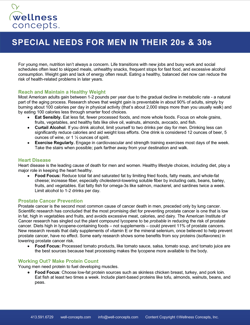Men in their 20s and 30s may feel they are in their prime, with no need to worry about their health for at least another decade. However, habits formed as a young man can significantly impact health down the road. Here are some things for men in their 20s and 30s to keep in mind, adapted from our seminar, Men's Guide to Optimal Health.
For young men, nutrition isn’t always a concern. Life transitions with new jobs and busy work and social schedules often lead to skipped meals, unhealthy snacks, frequent stops for fast food, and excessive alcohol consumption. Weight gain and lack of energy often result. Eating a healthy, balanced diet now can reduce the risk of health-related problems in later years.
Reach and Maintain a Healthy Weight
Most American adults gain between 1-2 pounds per year due to the gradual decline in metabolic rate a natural part of the aging process. Research shows that weight gain is preventable in about 90% of adults, simply by burning about 100 calories per day in physical activity (that’s about 2,000 steps more than you usually walk) and by eating 100 calories less through smarter food choices.
- Eat Sensibly. Eat less fat, fewer processed foods, and more whole foods. Focus on whole grains, fruits, vegetables, and healthy fats like olive oil, walnuts, almonds, avocado, and fish.
- Curtail Alcohol. If you drink alcohol, limit yourself to two drinks per day for men. Drinking less can significantly reduce calories and aid weight loss efforts. One drink is considered 12 ounces of beer, 5 ounces of wine, or 1 ½ ounces of spirit.
- Exercise Regularly. Engage in cardiovascular and strength training exercises most days of the week. Take the stairs when possible; park farther away from your destination and walk.
Heart Disease
Heart disease is the leading cause of death for men and women. Healthy lifestyle choices, including diet, play a major role in keeping the heart healthy.
- Food Focus: Reduce total fat and saturated fat by limiting fried foods, fatty meats, and whole-fat cheese; increase fiber, especially cholesterol-lowering soluble fiber by including oats, beans, barley, fruits, and vegetables. Eat fatty fish for omega-3s like salmon, mackerel, and sardines twice a week. Limit alcohol to 1-2 drinks per day.
Prostate Cancer Prevention
Prostate cancer is the second most common cause of cancer death in men, preceded only by lung cancer. Scientific research has concluded that the most promising diet for preventing prostate cancer is one that is low in fat, high in vegetables and fruits, and avoids excessive meat, calories, and dairy. The American Institute of Cancer research has singled out the plant compound lycopene to be probable in reducing the risk of prostate cancer. Diets high in lycopene-containing foods – not supplements – could prevent 11% of prostate cancers. New research reveals that daily supplements of vitamin E or the mineral selenium, once believed to help prevent prostate cancer, have no effect. Some early research shows some benefits from soy proteins (isoflavones) in lowering prostate cancer risk.
- Food Focus: Processed tomato products, like tomato sauce, salsa, tomato soup, and tomato juice are the best sources because heat processing makes the lycopene more available to the body.
Working Out? Make Protein Count
Young men need protein to fuel developing muscles.
- Food Focus: Choose low-fat protein sources such as skinless chicken breast, turkey, and pork loin. Eat fish at least two times a week. Include plant-based proteins like tofu, almonds, walnuts, beans, and peas.


